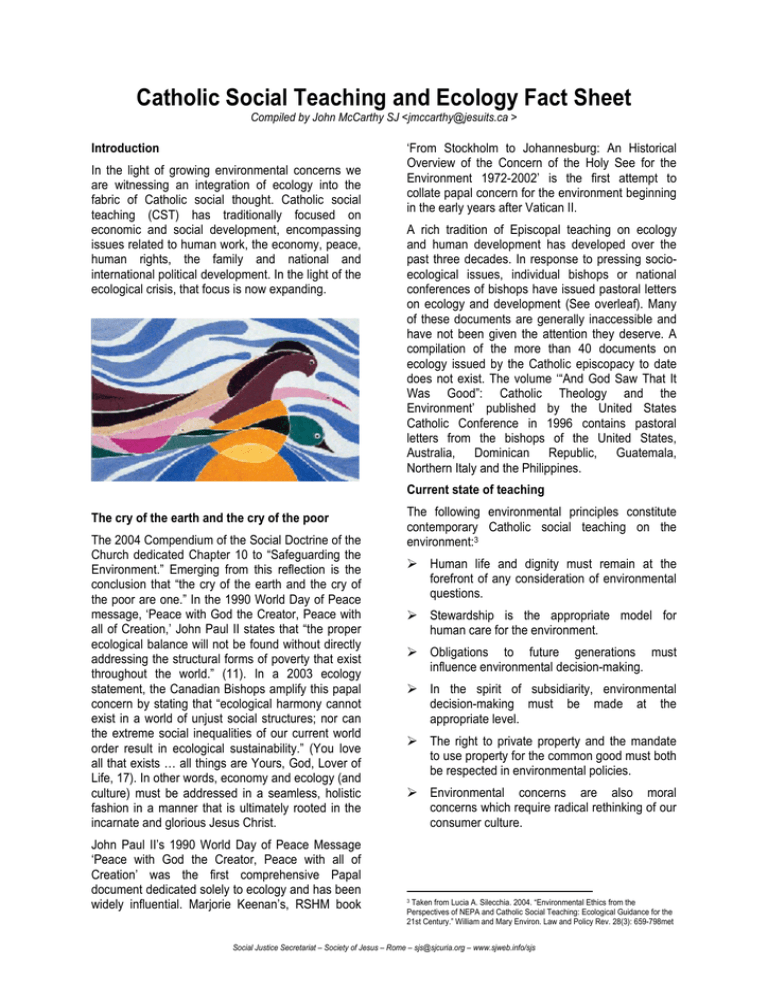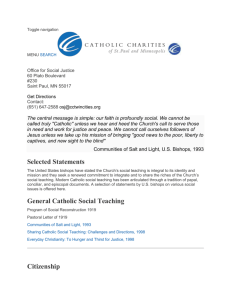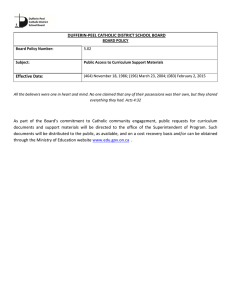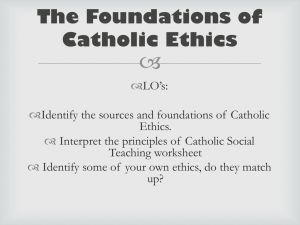Catholic Social Teaching and Ecology Fact Sheet
advertisement

Catholic Social Teaching and Ecology Fact Sheet Compiled by John McCarthy SJ <jmccarthy@jesuits.ca > Introduction In the light of growing environmental concerns we are witnessing an integration of ecology into the fabric of Catholic social thought. Catholic social teaching (CST) has traditionally focused on economic and social development, encompassing issues related to human work, the economy, peace, human rights, the family and national and international political development. In the light of the ecological crisis, that focus is now expanding. ‘From Stockholm to Johannesburg: An Historical Overview of the Concern of the Holy See for the Environment 1972-2002’ is the first attempt to collate papal concern for the environment beginning in the early years after Vatican II. A rich tradition of Episcopal teaching on ecology and human development has developed over the past three decades. In response to pressing socioecological issues, individual bishops or national conferences of bishops have issued pastoral letters on ecology and development (See overleaf). Many of these documents are generally inaccessible and have not been given the attention they deserve. A compilation of the more than 40 documents on ecology issued by the Catholic episcopacy to date does not exist. The volume ‘“And God Saw That It Was Good”: Catholic Theology and the Environment’ published by the United States Catholic Conference in 1996 contains pastoral letters from the bishops of the United States, Australia, Dominican Republic, Guatemala, Northern Italy and the Philippines. Current state of teaching The cry of the earth and the cry of the poor The 2004 Compendium of the Social Doctrine of the Church dedicated Chapter 10 to “Safeguarding the Environment.” Emerging from this reflection is the conclusion that “the cry of the earth and the cry of the poor are one.” In the 1990 World Day of Peace message, ‘Peace with God the Creator, Peace with all of Creation,’ John Paul II states that “the proper ecological balance will not be found without directly addressing the structural forms of poverty that exist throughout the world.” (11). In a 2003 ecology statement, the Canadian Bishops amplify this papal concern by stating that “ecological harmony cannot exist in a world of unjust social structures; nor can the extreme social inequalities of our current world order result in ecological sustainability.” (You love all that exists … all things are Yours, God, Lover of Life, 17). In other words, economy and ecology (and culture) must be addressed in a seamless, holistic fashion in a manner that is ultimately rooted in the incarnate and glorious Jesus Christ. John Paul II’s 1990 World Day of Peace Message ‘Peace with God the Creator, Peace with all of Creation’ was the first comprehensive Papal document dedicated solely to ecology and has been widely influential. Marjorie Keenan’s, RSHM book The following environmental principles constitute contemporary Catholic social teaching on the environment:3 ¾ Human life and dignity must remain at the forefront of any consideration of environmental questions. ¾ Stewardship is the appropriate model for human care for the environment. ¾ Obligations to future generations must influence environmental decision-making. ¾ In the spirit of subsidiarity, environmental decision-making must be made at the appropriate level. ¾ The right to private property and the mandate to use property for the common good must both be respected in environmental policies. ¾ Environmental concerns are also moral concerns which require radical rethinking of our consumer culture. 3 Taken from Lucia A. Silecchia. 2004. “Environmental Ethics from the Perspectives of NEPA and Catholic Social Teaching: Ecological Guidance for the 21st Century.” William and Mary Environ. Law and Policy Rev. 28(3): 659-798met Social Justice Secretariat – Society of Jesus – Rome – sjs@sjcuria.org – www.sjweb.info/sjs Documents on Catholic Social Teaching and Ecology 1975. This Land is Home to me. Appalachian Catholic Bishops. 1980. Zukunft der Schöpfung-Zukunft der Menschheit. Erklärung der Deutschen Bischofskonferenz zu Fragen der Umwelt und der Energieversorgung. 1982. Der Mensch und seine Umwelt. Hirtenbreif der Schweizer Bischöfe zum Eidgenössischen Bettag. 1982. Desertification of Ghana. Justice and Peace Commission of the Catholic Church of Ghana. 1983. Peasants and Land. A Pastoral Letter from the Bishops of Paraguay. 1985. Wanted: A Rational National Policy on Timber and Farming Operations. Justice and Peace Commission of the Catholic Church of Ghana. 1985. Verantwortung wahrnemen für die Schöpfung (Taking Responsibility for Creation). Gemeinsame Erklärung des Rates der Evangelischen Kirche in Deutschland und der Deutschen Bischofskonferenz. in the Cosmos. Episcopal Commission for Social Affairs of the Canadian Conference of Catholic Bishops. 1995. Letter to the Faithful: The Omai Awakening. Pastoral Letter from B. Singh, Bishop of Georgetown, Guyana. 1995. At Home in the Web of Life: A Pastoral Letter on Sustainable Communities in Appalachia Celebrating the 20th Anniversary of This Land is Home to Me from the Catholic Bishops of Appalachia. 1998. Handeln für die Zukunft der Schöpfung. Die deutschen Bischöfe: Kommission für gesellschaftliche und soziale Fragen. 1998. Celebrate Life: Care for Creation. The Alberta Bishops’ Letter on Ecology. 1999. Pastoral Statement on the Environmental Crisis. Southern African Catholic Bishops’ Conference. 1998. Partnership for the Future. A Pastoral Statement of the Roman Catholic Bishops in New Mexico. 2000. Care for the Earth: A Statement on Ecology and the Family Farm. Indiana Catholic Conference. 1987. Carta Pastoral de la Conferencia del Episcipado Dominicano sobre la relación del hombre con la naturaleza. (Pastoral Letter on the Relationship of Humanity with Nature). Conferencia del Episcipado Dominicano. 2000. A Pastoral Letter on the Forests of the Sierra Tarahumara. Catholic Bishops of Northern Mexico. 1988. Ecology: The Bishops of Lombardy Address the Community. The Catholic Bishops of Northern Italy. 2001. Reverence for Life: A Message for the Twenty-First Century from the Catholic Bishops of Japan. The Catholic Bishops’ Conference of Japan. 1988. Nota Pastoral sobre a Preservação do Meio Ambiente (Pastoral Letter on the Preservation of our Environment). Conferéncia Episcopal Portugeuesa. 1988. What is Happening to our Beautiful Land: A Pastoral Letter on Ecology. Catholic Bishops’ Conference of the Philippines. 1989. Espiritualidad para una Ecologia Cristiana Integral (Spirituality for an Integral Christian Ecology). Carlos Gonzalez, Obispo de Talca, Conferencia Episcopal de Chile. 1990. Ecología y Turismo en Nuestras Islas (Ecology and Tourism in our Islands). Carta de los Obispos de Baleares, Spain. 2000. And God Saw That It Was Good. A Pastoral Letter of the Bishops of the Boston Province. 2001. The Columbia River Watershed: Caring for Creation and the Common Good: An International Pastoral Letter by the Catholic Bishops of the Columbia River Region. 2001. Global Climate Change: A Plea for Dialogue, Prudence, and the Common Good. A Statement of the United States Conference of Catholic Bishops. 2001. Le respect de la création. Commission sociale des évêques de France. 2001. Cri de la terre et cri des pauvres. Comité des affaires sociales de l'Assemblée des évêques catholiques du Québec. 1990. Reverence and Responsibility. Pastoral Letter on the Environment by Bishop Anthony M. Pilla of Cleveland, Ohio. 2002. The Call of Creation: God’s Invitation and the Human Response. The Natural Environment and Catholic Social Teaching. Catholic Bishops’ Conference of England and Wales. 1991. The Earth is our Home. Pastoral Message by Bishop D. Pfeifer, OMI of San Angelo Diocese, Texas. 2002. A New Earth – The Environmental Challenge. Australian Catholic Bishops Statement on the Environment. 1991. Companions in Creation. Florida Catholic Conference. 2003. You love all that exists … all things are Yours, God, love of life” A Pastoral Letter on the Christian Ecological Imperative from the Social Affairs Commission, Canadian Conference of Catholic Bishops. 1991. Christians and their Duty towards Nature. Australian Bishops’ Committee for Justice, Development and Peace. 1991. Renewing the Earth: An Invitation to Reflection and Action on Environment in Light of Catholic Social Teaching. A Pastoral Statement of the United States Catholic Conference. 2004. Pastoral Letter on the Environment. Dermot Clifford, Archbishop of Cashel and Emly. 1992. Protect the Pacific environment. Francis Lambert, President, Conference of Catholic Bishops of the Pacific. 2004. Let the Many Coastlands be Glad: A Pastoral Letter on the Great Barrier Reef. Catholic Bishops of Queensland. 1992. Creación, crisis ecológica y Opción por la vida (Creation, Ecological Crisis, and Option for Life). Pastoral Letter by Raúl Corriveau, Obispo de Choluteca, Honduras. 2005. Notre mode de vie est-il durable ? Nouvel horizon de la responsabilité. Justice et paix France. Édition Karthala. 1992. A Igreja e a questão écólogica (The Church and the Ecological Question). Conferência Nacional dos Bispos do Brasil. 1993. Carta Pastoral sobre La Ecologia (Pastoral Letter on Ecology). Bishop of Ancud, Juan Luis Ysern de Arce. 1993. Tengo Sed: Campaña de Comunicación Cristiana de Bienes. Conferencia Episcopal Colombiana. 1995. The Environmental Crisis: The Place of the Human Being 2006. Our World is Facing an Ecological Crisis. Bishops’ Conference of New Zealand. 2006. Remove the sandals from your feet … you are standing On Holy Ground: An Ecological Vision for Catholic Education in New South Wales. Catholic Earthcare Australia. With Greetings from Bishop Christopher Toohey. Chair of Bishops’ Commission for Justice and Service. 2006. Der Klimawandel: Brennpunkt globaler, intergenerationeller und ökologischer Gerechtigkeit. Deutsche Bischofskonferenz. Social Justice Secretariat – Society of Jesus – Rome – sjs@sjcuria.org – www.sjweb.info/sjs





